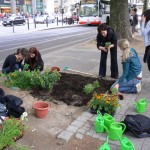 Earlier this year I attended an event and was introduced to the concept of Guerrilla Gardening. The concept is kinda cool, and sees locals within a community encouraged to make public green spaces as nice and colourful as possible. One such group operating in my local area is the Mobile Gardener, who are attempting the not insignificant task of greening up my local patch of Elephant & Castle.
Earlier this year I attended an event and was introduced to the concept of Guerrilla Gardening. The concept is kinda cool, and sees locals within a community encouraged to make public green spaces as nice and colourful as possible. One such group operating in my local area is the Mobile Gardener, who are attempting the not insignificant task of greening up my local patch of Elephant & Castle.
Central to the whole movement is of course a sharing of hints and tips amongst the community of gardeners. For those of a perhaps slightly less anarchistic persuasion, there are other methods of sharing hints and tips with your green fingered brethren. One of the more interesting of these is undoubtedly Greenius.
Greenius is a new social network that aims to turn gardening into a much more collaborative endeavour. The site allows gardeners to easily share their efforts with like minded peers over the web. The concept behind the site is quite ingenious. Each user is allocated a virtual plot of land that can be populated with all of the plants and flowers that you’re filling your own plot with in real life.
Greenius then goes to work, connecting up each member with others that are growing the same things. Users can also maintain a blog of their gardening work, using Twitter style hashtags to help connect up common themes throughout the gardening world. This linkage helps to create discussion feeds around popular topics, allowing a strong and comprehensive knowledge base to form. The site also offers community features, thus allowing hints and tips to be exchanged between members of varying experience levels.
Despite the outstanding efforts of groups such as the Guerrilla Gardeners, the pursuit can often be a lonely endeavour. Sites such as Greenius can therefore act as a simple to use bridge between what you’re doing and others of a similar persuasion.
Suffice to say, this isn’t the only venture of this kind. I wrote last year about a new social venture forming around bee keeping. The project, called Bybi, aims not only to provide new homes for bees, but also to provide work for the homeless.
Founder Oliver Maxwell created an ecosystem whereby businesses in Copenhagen could apply to house a bee hive on the roof of their office building. The homeless in the city could then apply for training to become a bee keeper and tend to these hives on a daily basis.